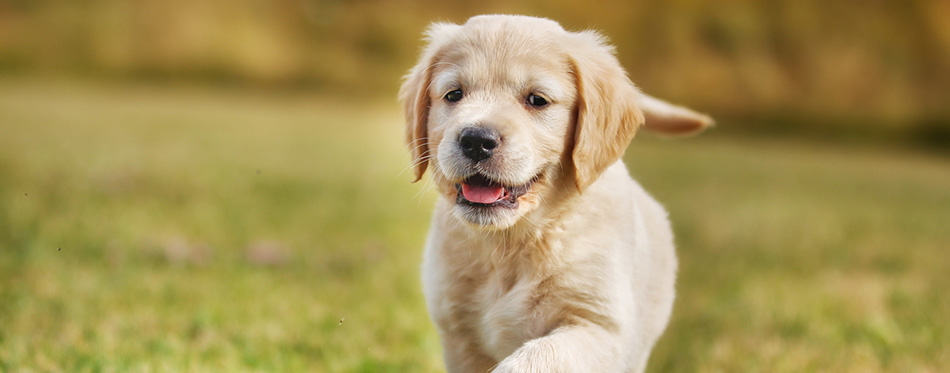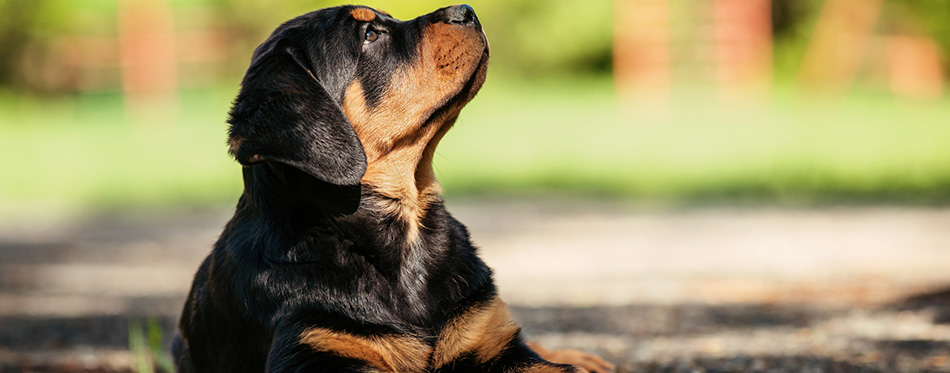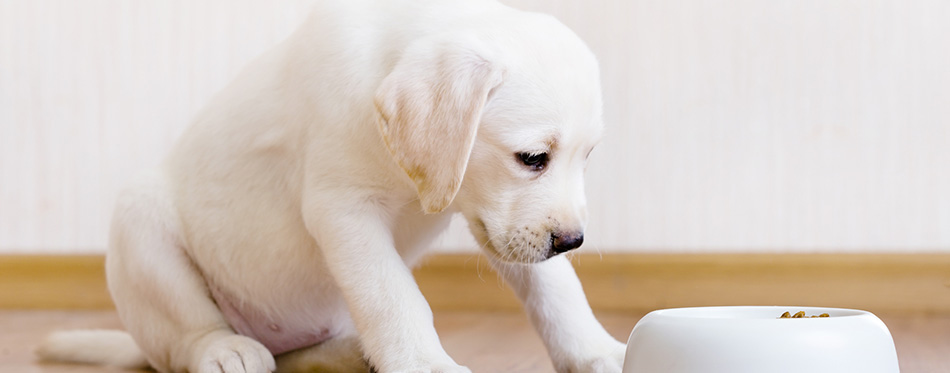While they are a big responsibility, the decision to get a new puppy can be a wonderful experience for you and your family. But that little bundle of fur is totally reliant on you, not only to care for them but set them on the right track to become a well-trained and happy adult dog. And this can be daunting, especially if you are a first-time pup parent. To help you on the road to dog ownership, we set out all the essentials you need to know in our nine-step foolproof guide to raising a puppy.
What to Consider When Raising a Puppy
Although hugely rewarding and enormous fun, raising puppies is not always easy and so it’s important to know what you are letting yourself in for. But with the right approach as well as knowledge, you will soon create a life-long four-legged friend.
Before getting your new pup, you do need to be sure you are available to meet his needs. Pups need high levels of attention during the early stages, so cannot be left for too long on their own. They also need consistent training and can be expensive, not just to buy but also to look after. The breed you choose needs to match your home life and you also need to be prepared for a long-term commitment, as most breeds can live to 10 years, or more.
Related Post: Chew & Teething Toys for Puppies

Visit The Vet
One of the first things you need to do when bringing a puppy home is to book a visit to your vet. This gives a professional the chance to check your new pup over for any hidden health issues as well as potential worms or parasites. From this initial check-up, you will also be able to start a flea, tick and worm program to keep your little one parasite free.
Another important aspect of an initial vet visit is to establish a vaccination schedule, as well as book your pup in to be neutered as soon as it’s appropriate. As a new puppy owner, some quality time with a vet at the beginning of your pet-owning journey also gives you the chance to ask any questions you may have about how to raise a happy and healthy pup. You should then arrange another appointment in six months so your puppy’s development progress can be reviewed.
Puppy-proofing Your Home
With all that energy, curiosity and puppy mischief, your young dog can cause havoc to your home. His inquisitive mind will see your house as an adventure playground, so when it comes to puppy care 101, it’s important to puppy-proof his new environment. First up, secure electrical cords and cover cables, which could attract those pin-sharp puppy teeth, and move any potentially poisonous objects, such as house plants, well out of his reach. Move anything that he could chew and swallow too, and make sure any toxic cleaning products in the kitchen or bathroom are locked away. If there are any rooms you don’t want your pup to go in, these need to be blocked off, as well as any possible danger zones such as the stairs or large vents. And as a final check, get yourself down to his puppy view and remove anything that could still be a temptation.
Products You’ll Need for Your New Puppy
Getting a new pup can be expensive, especially at the beginning when you need to stock up on all his essentials. But you don’t need to go out and buy a whole room full of products, as there are some key items that will more than meet his puppy needs. Here’s our puppy guide to his must-have products:
- Puppy safe food and water bowls – ideally stainless-steel or ceramic
- A crate or dog carrier plus his own dog bed and blanket for your home
- A new collar that fits well, plus a secure ID tag with all your essential contact details
- A leash or dog harness – you will need these once he has had his final vaccines and it’s safe to take him out
- Grooming essentials, including a dog nail trimmer, toothbrush, comb or dog brush plus shampoo formulated for pups
- High quality dog food formulated for puppies, plus pup-appropriate treats
- Plenty of puppy-safe toys
- Poop bags, puppy pads and disinfectant
Feeding Your Puppy
With all that energy and growth to support, your puppy has different nutritional needs to an adult dog and needs a high-quality diet that has been specifically formulated for pups. The type of food you choose will also depend on his size and breed as well as any sensitivities he may have. Smaller breeds also reach physical maturity faster than large breeds so, for further guidance check out our best puppy food guide. Your pup will initially need to be fed more often during the day, with most puppies starting out with four small meals a day to help sustain energy as well as prevent any feeding complications. As they grow, the number of meals per day will reduce – if you are in any doubt, a chat with your veterinarian is a good idea so you can safely tailor your pup’s daily feeding regime.
Check out our guide on Puppy Milk Replacer for more info.

Train and Socialize Your Pup
The earlier you train and socialize your pup, the sooner he will have the skills he needs not only to be a happy pup that knows his boundaries, but will grow into a well-rounded, safe and obedient adult dog.
When it comes to how to raise a dog, you will need to look at:
- Potty Training
One of your first tasks as soon as that cute pup comes into your home is to teach him how and where to go to the toilet. Housetraining from the get-go will help to prevent unwanted accidents around your home as well as help him to learn appropriate toilet behavior.
Establish a potty routine, working to the fact that pups need to poop or pee every few hours, and be vigilant; if your pup starts to squat in the house, whip them outside to the yard as soon as you can. Dogs also instinctively avoid soiling their bed or surrounding area so when you are unable to supervise your pup, keep them in a crate or confined space, so they get used to associating outside as their toilet area.
But you also need to be realistic and expect a few blips at the beginning – resist scolding your pup but reinforce any good behavior with plenty of praise to make the toilet training process as positive as possible.
- Crate Training
As well as helping with their toilet training, a crate will provide a safe, secure space for your puppy and also establishes confidence in being in a confined carrier such as travel crate. The idea is for your pup to see the crate as his den, a place where he can take some time out and get some peace and quiet. However, dogs younger than six months old should not be crated for longer than two-three hours, except for overnight. It is important to get the crate size just right, so it is not cramped or too large. When it comes to crate training, you should allow your pup to get acclimatized to using their crate and they should never be forced into it or locked inside against their will. Use treats, their favorite blanket or toy inside the crate, as well as plenty of praise and they will soon associate it as their happy, safe space. For a wider selection of choices, check out our guide on the best dog crates.
- Obedience Training
For their own safety, as well as your own, obedience training your pup is essential from an early age. Left to their own devices, puppies can develop a host of anti-social behaviors, from incessant barking and ignoring your commands to being territorial over their food. At a basic level, your pup should recognize and positively respond to the commands of ‘sit’, ‘stay’, ‘come’ and ‘wait’ so that you have the tools to keep them safe and close, whatever the environment or circumstance. Early obedience training – which should always be based on positive reinforcement – will also become the building blocks for more sophisticated and tailored training, even agility, as they get older.
- Leash Training
Ensuring your pup responds positively and obediently to their leash or harness is essential for safe and enjoyable walks, once he has all his vaccinations. And this means it’s a good idea to start his leash training before he is able to leave the home. Many puppies don’t take to their leash, collar or puppy harness straight away and will need a little time to get used to both wearing them and responding to your commands. Use your yard, garden and even inside your home to introduce your pup to their leash, then build up the time they get to wear it. Showing him how to behave when on his leash is also going to get you ahead, so use positive reinforcement and plenty of praise to teach him how to not pull against the leash and ultimately enjoy his walk.
- Puppy Socialization
The first 12-16 weeks of your puppy’s life are a huge learning curve and is the perfect time to get all his socialization skills in place. You want your pup to behave appropriately,
whether that’s with you, children, strangers or other dogs or pets. A well-socialized and confident puppy is the way to raise a dog that is non-aggressive but safe and happy to be in company, both human and animal. To do this, you need to positively expose your pup to as many new places, experiences and people as possible, as long as he has had all his jabs.
- Puppy Chewing
With those little pin-sharp baby teeth and a growing mouth, puppies need to chew but it’s important is to teach your pup what’s out of bounds when it comes to what they chew on. As well as keeping your belongings away from them, supervising your pup and clearly telling them ‘no’ while removing the object of their chewing attention is a good way to reinforce the behavior you want to see in your pet. And providing them with alternatives, such as chew treats and chew toys for puppies will steer their chewing needs onto something appropriate and safe. As a final point on puppy chewing, boredom can also trigger the behavior so making sure your pup is entertained and stimulated will keep him away from your favorite slippers.
Grooming Your Puppy
Grooming your pup will not only keep him looking smart but will also get him used to being handled. Your pup will need to learn to sit or stand still as he gets groomed, skills that will stand him in good stead as he gets older. Grooming not only includes brushing his coat, but also cleaning his eyes, ears, and teeth as well as trimming his nails. When starting out make sure you get pup-safe equipment that are gentle on his young paws and fur. Pups are also notorious for getting into mucky scrapes so can also be safely bathed as long as you take care. It can be a bit messy to start with, but bathing will get him used to being in water too. Just take it slowly and make sure you use a puppy shampoo that’s not harsh on his skin or irritates his eyes. And keep plenty of towels near to hand, so you can quickly get him out of the water and get him warm and dry.

Puppy Sleeping Arrangements
Puppies are like little dynamos, but to recharge after all that fun and playtime, they also need lots of rest. And getting your puppy sleep training right from the beginning is key to a harmonious home. As much as you may want to, resist letting your pup sleep on your bed, even as a way to soothe them on their first night, as it can quickly become a habit which means your bed is no longer your own! For the first few nights, it is ok to let them sleep in your bedroom if they are particularly unsettled, but set up their own bed space, ideally in a crate which they can quickly come to associate as their own. Ideally, you want them to be sleeping away from you, and a quiet corner in the kitchen is ideal. Wherever you place their bed or crate, make it cozy, with soft pads, blankets, and their favorite toys, with a few layers of newspaper underneath, in case that have a night-time pee accident. And be consistent with their sleeping arrangements so it becomes their puppy norm.
Puppy Play
Puppy play is not just about fun, it’s also a vital part of your little one’s development as it stimulates their mind as well as provides them with important strength training and exercise. Unstimulated, bored pups can actually turn into destructive monsters that can develop inappropriate behaviors in the long-term, which is something you want to avoid.
Playing with your new pup is also the perfect way to get to know them as well as for them to learn to trust and respond to you, resulting in a wonderful life-long bond.
Your new pet’s exercise needs will depend on their age as well as size and breed type, but for younger pups, playing around the home is enough to give them stimulation and burn off some of that puppy energy. Look for toys and games specifically designed for puppies as they need to be gentle enough on their delicate mouth and baby teeth as well as puppy games which help in their socialization and obedience training, such as fetch and tug-o-war. When they are vaccinated and safe to go out, daily walks and playtime in the park will add to their playtime experience. And, when it comes to how to raise a puppy, then fun, quality time is always your puppy 101!

